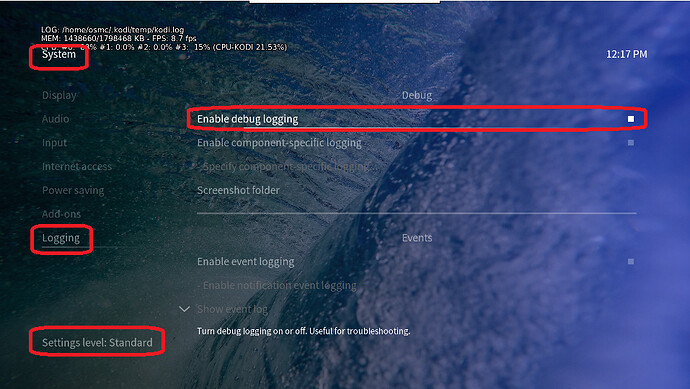This is the pattern I usually use for the configuration, with the October version nfs, video database and bluetooth audio do not work. I hope there is someone else to confirm or am I just out of luck … I solved it by installing the June version, I will try to update again.
** NFS **
OSMC as a server
To share files on your OSMC device with other devices proceed as follows. You can use NFS, SMB or UPnP. If sharing a USB drive or other removable media it first needs to be mounted in the filesystem. OSMC automatically mounts removable devices under the /media directory and automatically shares them if you have installed the SMB server (see below).
To share using NFS you need to install the nfs server:
sudo apt-get update
sudo apt-get install nfs-kernel-server
For NFS do not rely on the built-in automount which mounts removable drives under /media. Instead, add a line in fstab to mount the drive under /mnt so that its location and shared name is predictable. First make a directory under /mnt. Lets call it mySharedDrive.
sudo mkdir /mnt/mySharedDrive
Type blkid at the command prompt to get the UUID of the partition you want to mount. You will see something like this:
/dev/sda3: LABEL=“OSMCsystem” UUID=“db216be0-6d8e-45b6-97ad-0fd806e961dc” TYPE=“ext4”
Then edit file /etc/fstab (sudo nano /etc/fstab) and add a line to it like this
UUID=db216be0-6d8e-45b6-97ad-0fd806e961dc /mnt/mySharedDrive ext4 defaults,noatime,nofail,x-systemd.mount-timeout=30 0 0
but using the value of UUID for your partition.
Mount it with sudo mount -a
Use nano again to make a file /etc/exports which will contain lines like this:
/mnt/mySharedDrive 192.168.1.0/24(sync,no_subtree_check)
and then type sudo exportfs -a
In the example, the drive mounted at /mnt/mySharedDrive is shared with any device on the 192.168.1.x subnet. Access will be read-only by default.
** Bluetooth audio **
sudo apt-get update
sudo apt-get install a2dp-app-osmc
** MySQL DB **
$sudo apt-get update && sudo apt-get dist-upgrade to ensure that you have the very latest iteration of Raspbian.
$sudo apt-get install mysql-server to install MYSQL Server.
To configure MySQL to listen for connections from network hosts, $sudo nano /etc/mysql/mariadb.conf.d/50-server.cnf and change the bind-address directive to the server’s IP address:
from: bind-address = 127.0.0.1
to: bind-address = 192.168.0.5
Note: Replace 192.168.0.5 with the appropriate address.
Note: To allow both local and remote access (i.e. from both the MySQL host to itself and also from other clients), either comment out the bind-address using a hash (#) to disable it, or use bind-address = 0.0.0.0 to open it completely.
Restart your MySQL server: sudo service mysql restart
Get into the MySQL command line utility: sudo mysql
Enter the following commands:
Type in: CREATE USER ‘osmc’ IDENTIFIED BY ‘osmc’; and press return
Type in: GRANT ALL ON . TO ‘osmc’; and press return
Type in: flush privileges; and press return
Close out the command line tool with \q
